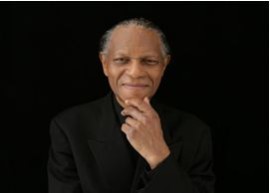The Legends Honor McCoy: McCoy Tyner / Ron Carter / Roy Haynes

In association with Blue Note Jazz Festival
McCoy Tyner’s blues-based piano style, replete with sophisticated chords and an explosively percussive left hand has transcended conventional styles to become one of the most identifiable sounds in improvised music. His harmonic contributions and dramatic rhythmic devices form the vocabulary of a majority of jazz pianists. At seventeen, he began a career-changing relationship with Miles Davis’ sideman saxophonist John Coltrane. Tyner joined Coltrane for the classic album My Favorite Things (1960), and remained at the core of what became one of the most seminal groups in jazz history, The John Coltrane Quartet.
Tyner’s name was propelled to international renown, as he developed a new vocabulary that transcended the piano styles of the time, providing a unique harmonic underpinning and rhythmic charge essential to the group’s sound. After over five years with Coltrane’s quartet, Tyner left the group to explore his destiny as a composer and bandleader. His 1972 Grammy-award nomination album Sahara, broke new ground by the sounds and rhythms of Africa. He has since released nearly 80 albums, awarded Jazz Master from the National Endowment for the Arts, and has earned four Grammys.
The record shows that Tyner, who now carries the torch as the only surviving member of the John Coltrane Quartet, is still at the top of his game as a composer, performer, and bandleader. He continues to leave his mark on generations of improvisers, and yet remains a disarmingly modest and spiritually directed man.
Ron Carter is among the most original, prolific, and influential bassists in jazz. With more than 2,000 albums to his credit, he has recorded with many of music’s greats: Tommy Flanagan, Gil Evans, Lena Horne, Bill Evans, B.B. King, the Kronos Quartet, Dexter Gordon, Wes Montgomery, and Bobby Timmons. After touring in the early 1960s, he became a member of the classic and acclaimed Miles Davis Quintet. Currently, after 18 years on the faculty of the Music Department of The City College of New York, he is now a Distinguished Professor Emeritus. In addition to teaching, arranging music, lecturing, conducting, and writing two books, Carter remains as active as ever as a performer.
Carter is a two-time Grammy winner and has been named Outstanding Bassist of the Decade by the Detroit News, Jazz Bassist of the Year by Downbeat magazine, and Most Valuable Player by the National Academy of Recording Arts and Sciences. Other distinctions include two honorary doctorates from the New England Conservatory of Music and the Manhattan School of Music, France’s Commander of the Order of Arts and Letters medallion and title, and he was named the 2002 recipient of the prestigious Hutchison Award from the Eastman School at the University of Rochester.
A veteran drummer long overshadowed by others, but finally in the 1990s gaining recognition for his talents and versatility, Roy Haynes has been a major player for half a century. He worked early on with the Sabby Lewis big band, Frankie Newton, Luis Russell (1945-1947), and Lester Young (1947-1949). After some engagements with Kai Winding, Haynes was a member of the Charlie Parker Quintet (1949-1952); he also recorded during this era with Bud Powell, Wardell Gray, and Stan Getz. Haynes toured the world with Sarah Vaughan (1953-1958); played with Thelonious Monk in 1958; led his own group; and gigged with George Shearing, Lennie Tristano, Eric Dolphy, and Getz (1961). He was Elvin Jones’ occasional substitute with John Coltrane’s classic quartet during 1961-1965, toured with Getz (1965-1967), and was with Gary Burton (1967-1968). In addition to touring with Chick Corea (1981 and 1984) and Pat Metheny (1989-1990), Haynes has led his own Hip Ensemble on and off during the past several decades. When one considers that he has also gigged with Miles Davis, Art Pepper, Horace Tapscott, and Dizzy Gillespie, it is fair to say that Haynes has played with about everyone. He led dates for EmArcy and Swing (both in 1954), New Jazz (1958 and 1960), Impulse (a 1962 quartet album with Roland Kirk), Pacific Jazz, Mainstream, Galaxy, Dreyfus, Evidence, and Storyville. In 1994, Haynes was awarded the Danish Jazzpar prize, and two years later, he received the prestigious French Chevalier des l’Ordres Artes et des Lettres.
In the late ’90s, Haynes formed a trio with pianist Danilo Perez and bassist John Pattitucci, and they released their debut album, The Roy Haynes Trio Featuring Danilo Perez & John Pattitucci, in early 2000 on Verve. Haynes’ son Graham is an excellent cornetist. Haynes paid tribute to Charlie Parker in 2001 with Birds of a Feather, his fourth release for the Dreyfus Jazz label, which was subsequently nominated for a Grammy in 2002; Fountain of Youth followed two years later. Also released in 2004, Quiet Fire compiled two of his prior releases for Galaxy (1977’s Thank You Thank You and 1978’s Vistalite) into one back-to-back record. Whereas appeared in mid-2006, and it earned Haynes a Grammy nomination for Best Jazz Instrumental Solo.
June 4, 2016 | 5:00pm – 10:00pm – Free
Central Park – Rumsey Playfield
72nd Street and 5th Avenue
New York NY 10021 US
http://bit.ly/1TcGGrQ